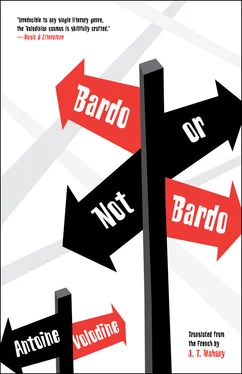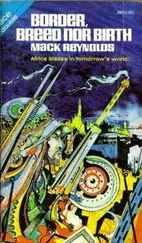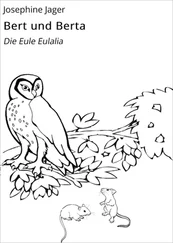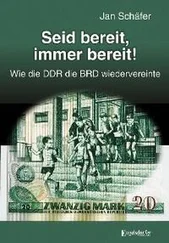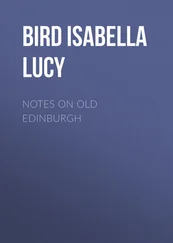“This is worse than death,” said Schlumm.
“Oh, worse,” said Puffky.
From time to time, the jukebox would lighten the mood by narrating dreamlike sketches taking place in parallel hells to those of the wombs or the surface world. One was thus entitled to supplementary tragicomedy, to the adventures of Abram Schlumm, the egalitarian, or Freek Schlumm, the Untermensch, and even other poets of the same tribe, even more infamous and minor heteronyms. They were expressed in general language, less closed than the dodecaphone’s: all the words were intelligible, and the syntax hardly strayed from beaten paths, but, in the end, only a few snippets could be obliquely understood. To make matters worse, between responses and playlets, the machine would sometimes daydream. It muttered exquisite corpses, producing surrealist sayings.
Autopsy believed to take, the machine would say. . Out at sea the old garden spider broke the box of clowns. . We flew away in our own secrets to tell. . I repeat: we threw away ten-hour foam secrets who yell. . Without spindrift names, the bonzesses laughed. . They had foretold piercing our memories, TOWARD THE PLOP. . I repeat: they had four gold piercings of sour mulberries, TO WARD THE FLOP. .
While all the responses were being pronounced, an intense non-sympathy with the texts ran through the listeners’ spines. Entire clusters of nights went by, we remained sitting, growing thinner in the dark, we couldn’t recap anything, repeat anything, we no longer knew what was happening.
The machine sputtered in its corner, illuminating the surrounding mounds, humps, and clods.
Neither Puffky nor Schlumm stirred or flinched. They were slumped, side by side, scrutinizing the sole purplish ray to come out safe from the beating. This smear of color brushed against their toes so sadly that it incited them to become even more immobile. On account of the scene’s drained appearance, and because of how miserable the light was, it was tempting to imagine the two men as working a theatrical ceremony with neither plot nor dialogue, and whose rehearsal had fallen apart. Since the old rags enveloping them gave them an asexual appearance, they seemed to be silently brooding on the reasons they had so poorly interpreted their role as two blind mendicants, perhaps having drunk to forget their degradation and their fears, now distraught in the disaster’s midst. This brooding was prolonged and inconclusive.
At present, there were few notable differences between Schlumm and Puffky. Schlumm had aged, his shoes had split apart, his clothes and even his skin had taken on the indistinctly ragged hue that without fail betrays the inhabitant of inescapable tunnels, the guest of what Tibetans, in their fictions, call the intermediary world, claiming, quite wrongly, that it is enough to wander there for forty-nine days to be reborn in the hereafter or beyond. Schlumm was now huddling against Puffky, as if Puffky had always been his best friend. He was no longer holding onto his legs. The heat of the space had defeated him, as well as the appalling idea that there was no womb at the cellar’s end, and so no hope of getting out. Whatever the length of eternity might be, he was going to have to get through it with Puffky, without being reborn and without understanding a thing, grasping at echoes he would have to pretend to identify and adopt and love like they came from his own head.
For a brief fortnight, their situation changed little. They meditated and dozed in turns. Their oppressed breathing was palpable. Sometimes, a jolt of somewhat forced joy would shake Puffky, with mad hiccups and shivers. The jukebox was the ultimate consultable archive, the sole spark of intelligence. It grumbled continuously and softly. Everything would have been different if we could have determined whose memories it was adulterating.
Dreamt of you, Schlumm, the machine fleetingly sighed. Dreamt of you. . Junks in pocket, you went back up June 27 thAvenue, TOWARD THE WOOD STOVE. .
“This Schlumm,” Schlumm said suddenly. “He reminds me of someone. His face is on the tip of my tongue.”
“We’re there,” said Puffky.
“What,” said Schlumm, his voice ponderous, drenched in somnambulism and bister. “What. Where are we.”
“I am speaking to you once more, oh noble son, oh Schmollowski,” a voice says.
A dispassionate voice.
The one speaking is an almost normal tantric monk. A lama like those we have learned to love, by dint of meeting so many of them throughout this story. He is draped in a robe covered in patches, overall raspberry color. Across his chest he is wearing an indigo canvas satchel along with various fabrics of ambiguous significance. His entire being emanates a dusty grandeur. At first glance, his dispassion seems based on much humor, and is not simulated. He tranquilly doesn’t give a fig about anything, but he feels no nihilistic anxiety. He could be any age, let’s say fifty-one so as not to be accused of lacking verisimilitude, but, to the credulous, he might say, deadpan, that he was born seven- or eight-hundred years ago, or even earlier still, for example before the world revolution. Suppose he tells this to Western adherents who lack common sense. No objection would arise. This detail, furthermore (his exact age) doesn’t concern us.
I said almost normal because he sports an unusual number of talismans, including a discreet lapel pin in the shape of a red star, whose central image has been scratched and wiped away, perhaps out of monastic nostalgia for non-violence or the demands of political prudence, perhaps a sub-machine gun, perhaps a terrorist acronym two or three characters long, perhaps the portrait of a guerrillero or philosopher. The pin is raspberry too. It disappears under a scarf and, from time to time, light falls on it and it gleams.
“Listen to me, Schmollowski,” the lama repeats.
He is in the middle of officiating in a Chinese temple, though not in the main hall. At this moment he is standing in the cramped room where the temple watchman naps when the too-heavy heat overwhelms the afternoon, a place serving also as a storeroom for bottles of oil, sticks of incense, two umbrellas, and cartons containing wads of paper money to be burnt for the posthumous comfort of the Chinese dead, so they can purchase essentials in the other world, along with anything frivolous they happen to find on sale. The lama is settled in the middle of this bric-a-brac, after having as always placed a dollar next to the miniscule towel into which the watchman sponges his sweat. Elsewhere, in front of official altars, he would perhaps not be tolerated, as he belongs to a dissident faction, politically and religiously incorrect, often asked to go minister under other roofs, sometimes politely and sometimes with nightsticks. So he visits Chinese districts, choosing places of worship where there is less risk of him being bothered with questions of dogma, but he does not abuse his hosts’ hospitality and he steers clear of major idols.
On a carton he has placed a portable gong, one with a clear and short sound, along with a photograph and the heap of hardened pages his personal copy of the Book of the Dead has been reduced to. Facing him, there is a wall blackened with molds and a lunar calendar surmounted by mythic Chinese generals and ministers who have absolutely nothing to do with Tibetan tantrism, so they can be disregarded here. From the ceiling hangs a bare light bulb, switched off. The only window looks rather like an embrasure, and is obscured by a pot of flowers. The room is damp, hot, and poorly lit. Outside noises come in from every angle and crystallize inside: the comings and goings of the devout with offerings, prices from the stock exchange in Cantonese that the watchman and temple seer, both drowsy, listen to with a distracted ear, and, to finish, the distant sounds of the street: slivers of voices, a motorcycle’s vroom as a handyman repairs it out in the open, horns from buses or taxis blocked by the crowd. A public market adjoins the temple.
Читать дальше
